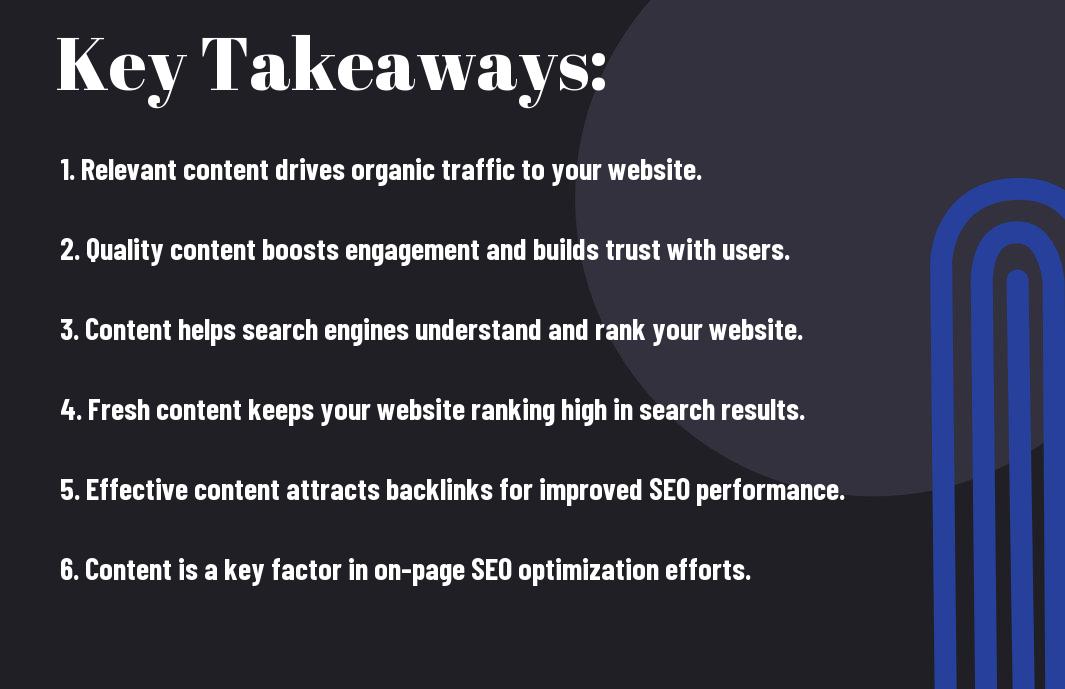As a digital marketer or website owner, you are likely aware of the crucial role that search engine optimization (SEO) plays in driving traffic to your site. However, you may not fully understand just how important quality content is in achieving high rankings on search engine results pages. In fact, your content is the backbone of your SEO strategy, and without it, you may struggle to attract and retain the attention of search engines and potential visitors. In this blog post, we will explore the key reasons why content is so critical to SEO success, and provide some tips for creating and optimizing your content to improve your search engine rankings.
Key Takeaways:
- Quality content is crucial for SEO: Creating high-quality, relevant content is essential for improving your website’s search engine rankings.
- Keyword optimization is important: Incorporating relevant keywords into your content helps search engines understand what your website is about and improves its visibility.
- Fresh content attracts audiences: Regularly updating your website with new and engaging content can attract and retain more visitors, ultimately improving SEO.
- Content supports link building: Having valuable content can encourage other websites to link back to yours, which can improve your website’s authority and SEO performance.
- User experience is enhanced with good content: Providing valuable and informative content to users can lead to a better overall user experience, which can positively impact your SEO efforts.

Content Quality and SEO
Assuming you understand the significance of content in SEO, it is crucial to also recognize the impact of content quality on your website’s search engine rankings. Your content quality is a direct reflection of your expertise, authority, and trustworthiness. Google’s algorithm places a high value on content that is well-written, informative, and relevant to the user’s search intent. To gain a better understanding of this, you can read more about it in The Importance of Content in SEO.
The Impact of High-Quality Content
When it comes to high-quality content, the benefits for your SEO efforts cannot be understated. Not only does it help in establishing your authority and expertise in your industry, but it also keeps your audience engaged and encourages them to spend more time on your website. Additionally, high-quality content is more likely to be shared and linked to by other websites, which can significantly boost your search engine rankings. Ensuring that your content is well-researched, accurate, and provides genuine value to your audience is crucial for your SEO success.
Addressing Content Freshness and Relevance
Another critical aspect of content in SEO is its freshness and relevance. Search engines prioritize content that is up-to-date and relevant to current trends and topics. When you consistently update and refresh your content, you signal to search engines that your website is active and reliable. Moreover, by addressing the latest developments in your industry and providing valuable insights, you not only keep your audience engaged but also demonstrate your commitment to staying at the forefront of your field. This will positively impact your SEO efforts and help you rank higher in search results.
Keywords in Content
Not only is high-quality, relevant content crucial for SEO, but strategic use of keywords within your content can significantly impact your website’s search engine visibility. It plays an important role in ranking your website. For in-depth information on why content writing is important for SEO, you can check out 5 Reasons Why Content Writing Is Important for SEO.
Keyword Research and Optimization
When it comes to keywords, conducting thorough research is essential. Identify relevant keywords that your target audience is likely to use when searching for your products or services. By integrating these keywords strategically into your content, you can enhance its relevance for search engines. Ensure that you optimize your content by placing keywords in titles, headings, and throughout the body while maintaining a natural flow.
Balancing Keyword Use and Content Naturalness
It’s crucial to strike a balance between incorporating keywords and maintaining the natural flow and readability of your content. Over-optimization can result in a negative impact on your website’s ranking, as search engines often penalize keyword-stuffed content. Therefore, focus on using keywords organically within your content, ensuring that it delivers value to your audience. Remember, your content should always prioritize providing value to your readers, as this will ultimately lead to better SEO performance.
Content Structure and SEO
Despite all the technical aspects of SEO, content structure plays a vital role in determining the success of your website’s search engine optimization. In order to optimize your content effectively for search engines, you need to understand the importance of organizing your content in a user-friendly and search-engine friendly manner.
The Importance of Headings and Subheadings
When it comes to structuring your content for SEO, headings and subheadings are crucial. They not only make your content visually appealing and easy to read, but they also provide search engines with valuable information about the main topics and subtopics covered in your content. Using relevant and descriptive headings helps search engines understand the main points of your content, making it easier for them to index and rank your pages.
Internal Linking and User Navigation
Internal linking and user navigation are essential aspects of content structure that directly impact SEO. By strategically linking to other relevant pages within your website, you can help search engines discover and index more of your content while also improving the overall user experience. Additionally, a well-organized navigation system enhances user engagement and encourages visitors to explore more of your website, which can lead to higher rankings and increased organic traffic.

Content Promotion and Link Building
After creating high-quality content, the next crucial step in SEO is promoting that content and building links to it. Content promotion and link building are essential for making sure your content reaches the right audience and gains the necessary authority to rank well in search engine results.
Strategies for Promoting Content
When it comes to promoting your content, there are several effective strategies you can implement. You can start by sharing your content on social media platforms such as Twitter, Facebook, and LinkedIn. Additionally, you can reach out to influencers and ask them to share your content with their followers. Another powerful strategy is to leverage email marketing to send your content to your subscribers and encourage them to share it with their networks. By actively promoting your content, you can increase its visibility and attract more organic traffic to your website.
Earning Backlinks Through Content
One of the most effective ways to build links to your website is by creating valuable, engaging content that naturally attracts backlinks. When you consistently publish high-quality content that provides value to your audience, other websites and blogs are more likely to link back to it. This not only helps to improve your website’s authority and credibility in the eyes of search engines, but it also drives referral traffic to your site. Additionally, you can actively reach out to other website owners and bloggers to request backlinks to your content, especially if it offers unique insights or valuable information that their audience would benefit from. However, it’s important to ensure that the backlinks you earn are from reputable, relevant sources to avoid any negative impact on your SEO efforts.
The Importance of Content in SEO
Considering all points, it is clear that content is the backbone of SEO. Quality, relevant, and engaging content not only helps attract and retain visitors to your website, but it also plays a crucial role in improving your search engine rankings. By focusing on creating valuable and informative content for your audience, you can effectively position your website as an authority in your industry and ultimately drive more organic traffic. Additionally, well-crafted content helps build trust with your audience, which can ultimately lead to increased conversions and business growth. It is important to prioritize content creation as part of your overall SEO strategy in order to achieve long-term success in the digital landscape.
FAQ
Q: What is the importance of content in SEO?
A: Content is crucial in SEO as it provides valuable information to users and search engines. High-quality content helps improve rankings, drive traffic, and engage with your audience.
Q: How does content affect SEO rankings?
A: Search engines prioritize content that is relevant, useful, and unique. Well-optimized content with the right keywords, proper structure, and good readability can positively impact SEO rankings.
Q: What should be included in SEO-friendly content?
A: SEO-friendly content should include relevant keywords, informative headings, subheadings, and meta descriptions. It should also be well-structured, engaging, and provide value to the reader.
Q: Why is original content important for SEO?
A: Original content is important because it demonstrates expertise, authority, and trustworthiness. Search engines favor unique content and penalize websites with duplicate or plagiarized content.
Q: How frequently should content be updated for SEO purposes?
A: Regularly updating content is important for SEO. Search engines favor fresh and relevant content, so it’s recommended to update and refresh existing content periodically to maintain or improve SEO rankings.
